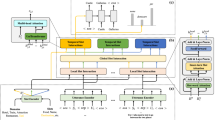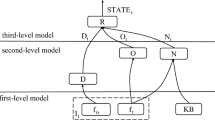Abstract
Dialogue state tracking (DST) task is a core component of task-oriented dialogue systems. Recently, several open-vocabulary-based models were proposed in multi-domain setting, which relies on copy mechanism and slot gate classification modules. However, as the ontology gets more and more complex, it becomes challenging to fill values to slots with type-specific features fully utilized, apply appropriate operation, and tackle the over-trivial carryover problem which used to be neglected. To address the above issues, a hierarchical gate-enhanced DST framework called DSA-Gate DST is proposed in this paper. Domain activity prediction and semantic confirming recognition modules are introduced to track slots from different domains discriminately. Experiment results on multi-domain task-oriented dialog corpora are conducted to show that our model outperforms various baseline algorithms in widely various language settings. Meanwhile, we conduct a comprehensive analysis on the noisy annotation in the MultiWoZ dataset from multiple aspects to explore the potential reasons which limiting DST’s performance.
Access this chapter
Tax calculation will be finalised at checkout
Purchases are for personal use only
Similar content being viewed by others
References
Nouri E, Hosseiniasl E (2018) Toward scalable neural dialogue state tracking model. In: 32nd Conference on neural information processing systems (NeurIPS 2018)
Ramadan O (2018) Large-scale multi-domain belief tracking with knowledge sharing. arXiv preprint arXiv:1807.06517v1
Gao S, Sethi A, Aggarwal S, Chung T, Hakkani-Tur D (2019) Dialog state tracking: a neural reading comprehension approach. arXiv preprint arXiv:1908.01946.
Kim S, Yang S, Kim G, Lee S-W (2019) Efficient dialogue state tracking by selectively overwriting memory. arXiv preprint arXiv:1911.03906
Wu C-S, Madotto A, Hosseini-Asl E, Xiong C, Socher R, Fung P (2019a) Transferable multi-domain state generator for task-oriented dialogue systems. arXiv preprint arXiv:1905.08743
Wu C-S, Socher R, Xiong C (2019b) Global-to-local memory pointer networks for task-oriented dialogue. arXiv preprint arXiv:1901.04713
Lei W, Jin X, Kan M-Y, Ren Z, He X, Yin D (2018) Sequicity: simplifying task-oriented dialogue systems with single sequence-to-sequence architectures. In: Proceedings of the 56th annual meeting of the association for computational linguistics, vol 1, Long Papers, pp 1437–1447
Ma Y, Zeng Z, Zhu D, Li X, Yang Y, Yao X, Zhou K, Shen J (2019) An end-to-end dialogue state tracking system with machine reading comprehension and wide & deep classification. arXiv preprint arXiv:1912.09297v1
Zhang L, Wang H (2021) Learn to focus: hierarchical dynamic copy network for dialogue state tracking. arXiv preprint arXiv:2107.1177825
Zhang J, Hashimoto K, Wu C, Wan Y, Yu PS, Socher R, Xiong C (2019) Find or classify? Dual strategy for slot-value predictions on multi-domain dialog state tracking. arXiv preprint arXiv:1910.03544
Goel R, Paul S, Hakkani-Tür D (2019) Hyst: a hybrid approach for flexible and accurate dialogue state tracking. arXiv preprint arXiv:1907.00883
Lee H, Lee J, Kim T-Y (2019) SUMBT: slot-utterance matching for universal and scalable belief tracking. arXiv preprint arXiv:1907.07421
Shan Y, Li Z, Zhang J, Meng F, Feng Y, Niu C, Zhou J (2020) A contextual hierarchical attention network with adaptive objective for dialogue state tracking. arXiv preprint arXiv:2006.01554
Cho K, van Merrienboer B, Bahdanau D, Bengio Y (2014) On the properties of neural machine translation: encoder-decoder approaches. arXiv preprint arXiv:1409.1259
Tsengy B-H, Daiz Y, Kreyssigy F, Byrne B (2021) Transferable dialogue systems and user simulators. arXiv preprint arXiv:2107.11904
Kim S, Chang M, Lee S-W (2021) NeuralWOZ: learning to collect task-oriented dialogue via model-based simulation. arXiv preprint arXiv:2105.14454
Le HT, Sahoo D, Liu C, Chen NF, Hoi SCH (2020b) Uniconv: a unified conversational neural architecture for multi-domain task-oriented dialogues. arXiv preprint arXiv:2004.14307
Ren L, Ni J, McAuley J (2019) Scalable and accurate dialogue state tracking via hieorarchical sequence generation, pp 1876–1885
Devlin J, Chang M, Lee K, Toutanova K (2018) Bert: pre-training of deep bidirectional transformers for language understanding. arXiv preprint arXiv:1810.04805
Hochreiter S, Schmidhuber J (1997) Long short-term memory. Neural Comput 9(8):1735–1780
Lin T-Y, Goyal P, Girshick R, He K, Dollár P (2017) Focal loss for dense object detection. In: Proceedings of the IEEE international conference on computer vision, pp 2980–2988
Eric M, Goel R, Paul S, Kumar A, Sethi A, Ku P, Goyal AK, Agarwal S, Gao S, Hakkani-Tur D (2019) MultiWOZ 2.1: a consolidated multi-domain dialogue dataset with state corrections and state tracking baselines. arXiv preprint arXiv:1907.01669v1.
Kingma DP, Ba J (2014). Adam: a method for stochastic optimization. arXiv preprint arXiv:1412.6980
Srivastava N, Hinton G, Krizhevsky A, Sutskever I, Salakhutdinov R (2014) Dropout: a simple way to prevent neural networks from overfitting. J Mach Learn Res 15:1929–1958
Budzianowski P, Wen T-H, Tseng B-H, Casanueva I, Ultes S, Ramadan O, Gašić M (2018) Multiwoz—a large-scale multi-domain wizard-of-oz dataset for task-oriented dialogue modelling. arXiv preprint arXiv:1810.00278.
Acknowledgements
This work was supported by the National Key R&D Program of China under grant 2019YFF0302601.
Author information
Authors and Affiliations
Corresponding author
Editor information
Editors and Affiliations
Rights and permissions
Copyright information
© 2023 The Author(s), under exclusive license to Springer Nature Singapore Pte Ltd.
About this paper
Cite this paper
Yu, C., Zhang, C., Hu, Z., Zhan, Z. (2023). Gate-Enhanced Multi-domain Dialog State Tracking for Task-Oriented Dialogue Systems. In: Chatterjee, P., Pamucar, D., Yazdani, M., Panchal, D. (eds) Computational Intelligence for Engineering and Management Applications. Lecture Notes in Electrical Engineering, vol 984. Springer, Singapore. https://doi.org/10.1007/978-981-19-8493-8_43
Download citation
DOI: https://doi.org/10.1007/978-981-19-8493-8_43
Published:
Publisher Name: Springer, Singapore
Print ISBN: 978-981-19-8492-1
Online ISBN: 978-981-19-8493-8
eBook Packages: Intelligent Technologies and RoboticsIntelligent Technologies and Robotics (R0)




